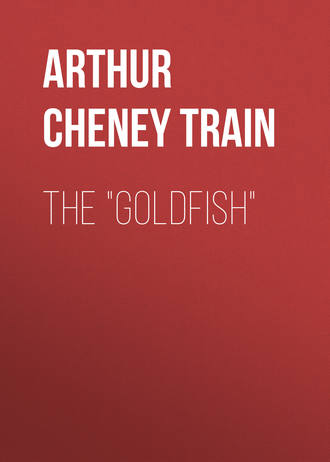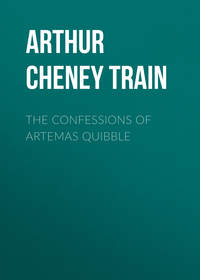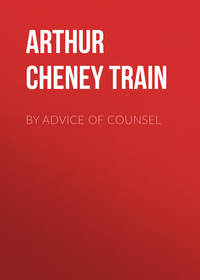 полная версия
полная версияThe "Goldfish"
I had listened attentively to what Hastings had to say; and, though I did not agree with all of it, I was forced to admit the truth of a large part. He certainly seemed to have come nearer to solving the problem than I had even been able to. Yet it appeared to my conservative mind shockingly socialistic and chimerical.
"So you really think," I retorted, "that the state ought to pass laws which should prevent the accumulation—or at least the retention—of large fortunes?"
Hastings smiled apologetically.
"Well," he answered, "I don't know just how far I should advocate active governmental interference, though it's a serious question. You're a thousand times better qualified to express an opinion on that than I am.
"When I spoke about health and police regulations I was talking metaphorically. I suppose my real idea is that the moral force of the community—public opinion—ought to be strong enough to compel a man to live so that such laws would be unnecessary. His own public spirit, his conscience, or whatever you call it, should influence him to use whatever he has above a certain amount for the common good—to turn it back where he got it, or somebody else got it, instead of demoralizing the whole country and setting an example of waste and extravagance. That kind of thing does an awful lot of harm. I see it all round me. But, of course, the worst sufferer is the man himself, and his own good sense ought to jack him up.
"Still you can't force people to keep healthy. If a man is bound to sacrifice everything for money and make himself sick with it, perhaps he ought to be prevented."
"Jim!" cried Mrs. Hastings, coming in with a pitcher of cider and some glasses. "I could hear you talking all the way out in the kitchen. I'm sure you've bored our guest to death. Why, the chestnuts are burned to a crisp!"
"He hasn't bored me a bit," I answered; "in fact we are agreed on a great many things. However, after I've had a glass of that cider I must start back to town."
"We'd love to have you spend the night," she urged. "We've a nice little guestroom over the library."
The invitation was tempting, but I wanted to get away and think. Also it was my duty to look in on the bridge party before it became too sleepy to recognize my presence. I drank my cider, bade my hostess good night and walked to the station with Hastings. As we crossed the square to the train he said:
"It was mighty good of you to come out here to see us and we both appreciate it. Hope you'll forgive my bluntness this morning and for shooting off my mouth so much this evening."
"My dear fellow," I returned, "that was what I came out for. You've given me something to think about. I'm thinking already. You're quite right. You'd be a fool to change places with anybody—let alone a miserable millionaire."
* * * * *In the smoker of the accommodation, to which I retired, I sat oblivious of my surroundings until we entered the tunnel. So far as I could see, Hastings had it on me at every turn—at thirty-three hundred a year—considerably less than half of what I paid out annually in servants' wages. And the exasperating part of it all was that, though I spent seventy-two thousand a year, I did not begin to be as happy as he was! Not by a jugful. Face to face with the simple comfort of the cottage I had just left, its sincerity and affection, its thrifty self-respect, its wide interests, I confessed that I had not been myself genuinely contented since I left my mother's house for college, thirty odd years before. I had become the willing victim of a materialistic society.
I had squandered my life in a vain effort to purchase happiness with money—an utter impossibility, as I now only too plainly saw. I was poisoned with it, as Hastings had said—sick with it and sick of it. I was one of Hastings' chaingangs of prosperous prisoners—millionaires shackled together and walking in lockstep; one of his school of goldfish bumping their noses against the glass of the bowl in which they were confined by virtue of their inability to live outside the medium to which they were accustomed.
I was through with it! From that moment I resolved to become a free man; living my own life; finding happiness in things that were worth while. I would chuck the whole nauseating business of valets and scented baths; of cocktails, clubs and cards; of an unwieldy and tiresome household of lazy servants; of the ennui of heavy dinners; and of a family the members of which were strangers to each other. I could and would easily cut down my expenditures to not more than thirty thousand a year; and with the balance of my income I would look after some of those sick babies Hastings had mentioned.
I would begin by taking a much smaller house and letting half the servants go, including my French cook. I had for a long time realized that we all ate too much. I would give up one of my motors and entertain more simply. We would omit the spring dash to Paris, and I would insist on a certain number of evenings each week which the family should spend together, reading aloud or talking over their various plans and interests. It did not seem by any means impossible in the prospect and I got a considerable amount of satisfaction from planning it all out. My life was to be that of a sort of glorified Hastings. After my healthy, peaceful day in the quiet country I felt quite light-hearted—as nearly happy as I could remember having been for years.
It was raining when I got out at the Grand Central Station, and as I hurried along the platform to get a taxi I overtook an acquaintance of mine—a social climber. He gave me a queer look in response to my greeting and I remembered that I had on the old gray hat I had taken from the quick lunch.
"I've been off for a tramp in the country," I explained, resenting my own instinctive embarrassment.
"Ah! Don't say! Didn't know you went in for that sort of thing! Well, good night!"
He sprang into the only remaining taxi without asking me to share it and vanished in a cloud of gasoline smoke. I was in no mood for waiting; besides I was going to be democratic. I took a surface car up Lexington Avenue and stood between the distended knees of a fat and somnolent Italian gentleman for thirty blocks. The car was intolerably stuffy and smelled strongly of wet umbrellas and garlic. By the time I reached the cross-street on which I lived it had begun to pour. I turned up my coat collar and ran to my house.
Somehow I felt like a small boy as I threw myself panting inside my own marble portal. My butler expressed great sympathy for my condition and smuggled me quickly upstairs. I fancy he suspected there was something discreditable about my absence. A pungent aroma floated up from the drawing room, where the bridge players were steadily at work. I confess to feeling rather dirty, wet and disreputable.
"I'm sorry, sir," said my butler as he turned on the electric switch in my bedroom, "but I didn't expect you back this evening, and so I told Martin he might go out."
A wave of irritation, almost of anger, swept over me. Martin was my perfect valet.
"What the devil did you do that for!" I snapped.
Then, realizing my inconsistency, I was ashamed, utterly humiliated and disgusted with myself. This, then, was all that my resolution amounted to after all!
"I am very sorry, sir," repeated my butler. "Very sorry, sir, indeed. Shall I help you off with your things?"
"Oh, that's all right!" I exclaimed, somewhat to his surprise. "Don't bother about me. I'll take care of myself."
"Can't I bring you something?" he asked solicitously.
"No, thanks!" said I. "I don't need anything that you can give me!"
"Very good, sir," he replied. "Good night, sir."
"Good night," I answered, and he closed the door noiselessly.
I lit a cigarette and, tossing off my coat, sank into a chair. My mere return to that ordered elegance seemed to have benumbed my individuality. Downstairs thirty of our most intimate friends were amusing themselves at the cardtables, confident that at eleven-thirty they would be served with supper consisting of salads, ice-cream and champagne. They would not hope in vain. If they did not get it—speaking broadly—they would not come again. They wanted us as we were—house, food, trappings—the whole layout. They meant well enough. They simply had to have certain things. If we changed our scale of living we should lose the acquaintance of these people, and we should have nobody in their place.
We had grown into a highly complicated system, in which we had a settled orbit. This orbit was not susceptible of change unless we were willing to turn everything topsy-turvy. Everybody would suppose we had lost our money. And, not being brilliant or clever people, who paid their way as they went by making themselves lively and attractive, it would be assumed that we could not keep up our end; so we should be gradually left out.
I said to myself that I ought not to care—that being left out was what I wanted; but, all the same, I knew I did care. You cannot tear yourself up by the roots at fifty unless you are prepared to go to a far country. I was not prepared to do that at a moment's notice. I, too, was used to a whole lot of things—was solidly imbedded in them.
My very house was an overwhelming incubus. I was like a miserable snail, forever lugging my house round on my back—unable to shake it off. A change in our mode of life would not necessarily in itself bring my children any nearer to me; it would, on the contrary, probably antagonize them. I had sowed the seed and I was reaping the harvest. My professional life I could not alter. I had my private clients—my regular business. Besides there was no reason for altering it. I conducted it honorably and well enough.
Yet the calm consideration of those very difficulties in the end only demonstrated the clearer to me the perilous state in which I was. The deeper the bog, the more my spirit writhed to be free. Better, I thought, to die struggling than gradually to sink down and be suffocated beneath the mire of apathy and self-indulgence.
Hastings' little home—or something—had wrought a change in me. I had gone through some sort of genuine emotional experience. It seemed impossible to reform my mode of life and thought, but it was equally incredible that I should fall back into my old indifference. Sitting there alone in my chamber I felt like a man in a nightmare, who would give his all to be able to rise, yet whose limbs were immovable, held by some subtle and cruel power. I had read in novels about men agonized by remorse and indecision. I now experienced those sensations myself. I discovered they were not imaginary states.
My meditations were interrupted by the entrance of my wife, who, with an anxious look on her face, inquired what was the matter. The butler had said I seemed indisposed; so she had slipped away from our guests and come up to see for herself. She was in full regalia—elaborate gown, pearls, aigret.
"There's nothing the matter with me," I answered, though I know full well I lied—I was poisoned.
"Well, that's a comfort, at any rate!" she replied, amiably enough.
"Where's Tom?" I asked wearily.
"I haven't any idea," she said frankly. "You know he almost never comes home."
"And the girls?"
"Visiting the Devereuxs at Staatsburg," she answered. "Aren't you coming down for some bridge?"
"No," I said. "To tell you the truth I never want to see a pack of cards again. I want to cut the game. I'm sick of our life and the useless extravagance. I want a change. Let's get rid of the whole thing—take a smaller house—have fewer servants. Think of the relief!"
"What's the matter?" she cried sharply. "Have you lost money?"
Money! Money!
"No," I said, "I haven't lost money—I've lost heart!"
She eyed me distrustfully.
"Are you crazy?" she demanded.
"No," I answered. "I don't think I am."
"You act that way," she retorted. "It's a funny time to talk about changing your mode of life—right in the middle of a bridge party! What have you been working for all these years? And where do I come in? You can go to your clubs and your office—anywhere; but all I've got is the life you have taught me to enjoy! Tom is grown up and never comes near me. And the girls—why, what do you think would happen to them if you suddenly gave up your place in society? They'd never get married so long as they lived. People would think you'd gone bankrupt! Really"—her eyes filled and she dabbed at them with a Valenciennes handkerchief—"I think it too heartless of you to come in this way—like a skeleton at the feast—and spoil my evening!"
I felt a slight touch of remorse. I had broached the matter rather roughly. I laid my hand on her shoulder—now so round and matronly, once so slender.
"Anna," I said as tenderly as I could, "suppose I did give it all up?"
She rose indignantly to her feet and shook off my hand.
"You'd have to get along without me!" she retorted; then, seeing the anguish on my face, she added less harshly: "Take a brandy-and-soda and go to bed. I'm sure you're not quite yourself."
I was struck by the chance significance of her phrase—"Not quite yourself." No; ever since I had left the house that morning I had not been quite myself. I had had a momentary glimpse—had for an instant caught the glint of an angel's wing—but it was gone. I was almost myself—my old self; yet not quite.
"I didn't mean to be unkind," I muttered. "Don't worry about me. I've merely had a vision of what might have been, and it's disgusted me. Go on down to the bridge fiends. I'll be along shortly—if you'll excuse my clothes."
"Poor boy!" she sighed. "You're tired out! No; don't come down—in those clothes!"
* * * * *I laughed a hollow laugh when she had gone. Really there was something humorous about it all. What was the use even of trying? I did not seem even to belong in my own house unless my clothes matched the wall paper! I lit cigarette after cigarette, staring blankly at my silk pajamas laid out on the bed.
I could not change things! It was too late. I had brought up my son and daughters to live in a certain kind of way, had taught them that luxuries were necessities, had neglected them—had ruined them perhaps; but I had no moral right now to annihilate that life—and their mother's—without their consent. They might be poor things; but, after all, they were my own. They were free, white and twenty-one. And I knew they would simply think me mad!
I had a fixed place in a complicated system, with responsibilities and duties I was morally bound to recognize. I could not chuck the whole business without doing a great deal of harm. My life was not so simple as all that. Any change—if it could be accomplished at all—would have to be a gradual one and be brought about largely by persuasion. Could it be accomplished?
It now seemed insuperably difficult. I was bound to the wheel—and the habits of a lifetime, the moral pressure of my wife and children, the example of society, and the force of superficial public opinion and expectation were spinning it round and round in the direction of least resistance. As well attempt to alter my course as to steer a locomotive off the track! I could not ditch the locomotive, for I had a trainload of passengers! And yet—
I groaned and buried my face in my hands. I—successful? Yes, success had been mine; but success was failure—naught else—failure, absolute and unmitigated! I had lost my wife and family, and my home had become the resort of a crew of empty-headed coxcombs.
I wondered whether they were gone. I looked at the clock. It was half-past twelve—Sunday morning. I opened my bedroom door and crept downstairs. No; they were not gone—they had merely moved on to supper.
My library was in the front of the house, across the hall from the drawing room, and I went in there and sank into an armchair by the fire. The bridge party was making a great to-do and its strident laughter floated up from below. By contrast the quiet library seemed a haven of refuge. Here were the books I might have read—which might have been my friends. Poor fool that I was!
I put out my hand and took down the first it encountered—John Bunyan's Pilgrim's Progress. It was a funny old volume—a priceless early edition given me by a grateful client whom I had extricated from some embarrassment. I had never read it, but I knew its general trend. It was about some imaginary miserable who, like myself, wanted to do things differently. I took a cigar out of my pocket, lit it and, opening the book haphazard, glanced over the pages in a desultory fashion.
"That is that which I seek for, even to be rid of this heavy Burden; but get it off myself, I cannot; nor is there any man in our country that can take it off my shoulders—"
So the Pilgrim had a burden too! I turned back to the beginning and read how Christian, the hero, had been made aware of his perilous condition.
"In this plight therefore he went home, and refrained himself as long as he could, that his Wife and Children should not perceive his distress, but he could not be silent long, because that his trouble increased: Wherefore at length he brake his mind to his Wife and Children; and thus he began to talk to them: 'Oh, my dear Wife,' said he, 'and you the Children of my bowels, I, your dear Friend, am in myself undone by reason of a Burden that lieth hard upon me.' … At this his Relations were sore amazed; not for that they believed that what he had said to them was true, but because they thought that some frenzy distemper had got into his head; therefore, it drawing toward night, and they hoping that sleep might settle his brains, with all haste they got him to bed: But the night was as troublesome to him as the day; wherefore, instead of sleeping, he spent it in sighs and tears."
Surely this Pilgrim was strangely like myself! And, though sorely beset, he had struggled on his way.
"Hast thou a Wife and Children?
"Yes, but I am so laden with this Burden that I cannot take that pleasure in them as formerly; methinks I am as if I had none."
Tears filled my eyes and I laid down the book. The bridge party was going home. I could hear them shouting good-bys in the front hall and my wife's shrill voice answering Good night! From outside came the toot of horns and the whir of the motors as they drew up at the curb. One by one the doors slammed, the glass rattled and they thundered off. The noise got on my nerves and, taking my book, I crossed to the deserted drawing room, the scene of the night's social carnage. The sight was enough to sicken any man! Eight tables covered with half-filled glasses; cards everywhere—the floor littered with them; chairs pushed helter-skelter and one overturned; and from a dozen ash-receivers the slowly ascending columns of incense to the great God of Chance. On the middle table lay a score card and pencil, a roll of bills, a pile of silver, and my wife's vanity box, with its chain of pearls and diamonds.
Fiercely I resolved again to end it all—at any cost. I threw open one of the windows, sat myself down by a lamp in a corner, and found the place where I had been reading. Christian had just encountered Charity. In the midst of their discussion I heard my wife's footsteps in the hall; the portières rustled and she entered.
"Well!" she exclaimed. "I thought you had gone to bed long ago. I had good luck to-night. I won eight hundred dollars! How are you feeling?"
"Anna," I answered, "sit down a minute. I want to read you something."
"Go ahead!" she said, lighting a cigarette, and throwing herself into one of the vacant chairs.
"Then said Charity to Christian: Have you a family? Are you a married man?"
"CHRISTIAN: I have a Wife and … Children."
"CHARITY: And why did you not bring them along with you?"
"Then Christian wept and said: Oh, how willingly would I have done it, but they were all of them utterly averse to my going on Pilgrimage."
"CHARITY: But you should have talked to them, and have endeavored to have shown them the danger of being behind.
"CHRISTIAN: So I did, and told them also what God had shewed to me of the destruction of our City; but I seemed to them as one that mocked, and they believed me not.
"CHARITY: And did you pray to God that He would bless your counsel to them?
"CHRISTIAN: Yes, and that with much affection; for you must think that my Wife and poor Children were very dear unto me.
"CHARITY: But did you tell them of your own sorrow and fear of destruction?—for I suppose that destruction was visible enough to you.
"CHRISTIAN: Yes, over and over, and over. They might also see my fears in my countenance, in my tears, and also in my trembling under the apprehension of the Judgment that did hang over our heads; but all was not sufficient to prevail with them to come with me.
"CHARITY: But what could they say for themselves, why they come not?
"CHRISTIAN: Why, my Wife was afraid of losing this World, and my Children were given to the foolish Delights of youth; so, what by one thing and what by another, they left me to wander in this manner alone."
An unusual sound made me look up. My wife was weeping, her head on her arms among the money and débris of the card-table.
"I—I didn't know," she said in a choked, half-stifled voice, "that you really meant what you said upstairs."
"I mean it as I never have meant anything since I told you that I loved you, dear," I answered gently.
She raised her face, wet with tears.
"That was such a long time ago!" she sobbed. "And I thought that all this was what you wanted." She glanced round the room.
"I did—once," I replied; "but I don't want it any longer. We can't live our lives over again; but"—and I went over to her—"we can try to do a little better from now on."
She laid her head on my arm and took my hand in hers.
"What shall we do?" she asked.
"We must free ourselves from our Burden," said I; "break down the wall of money that shuts us in from other people, and try to pay our way in the world by what we are and do rather than by what we have. It may be hard at first; but it's worth while—for all of us."
She disengaged one hand and wiped her eyes.
"I'll help all I can," she whispered.
"That's what I want!" cried I, and my heart leaped.
Again I saw the glint of the angel's wing!





